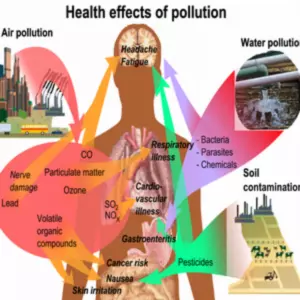Air is said to be polluted when certain substances are present in the air in such quantity and for such time that can injure your health or damage the environment. These substances are called air pollutants; they include dust, smoke and gases such as carbon monoxide, carbon dioxide, nitrogen oxide, sulphur dioxide and metal fumes.
Reactions among air pollutants can result in the production of secondary air pollutants such as smog and haze. Pollutants are produced by industries, vehicles, refineries, power plants etc.
About 1.5 billion people are exposed worldwide to air pollution and more than 3 million die from it globally each year.
Air pollution is associated with heart and lung diseases
Respiratory problems
Most air pollutants enter the human body through the nose and the lungs. The health problems caused include cough, dry throat, chest pains, breathlessness and asthmatic attacks. The risk of infections such as pneumonia ,running nose is also increased.
Indoor smoke plays a big role in the breathing problems, smoke blackens the lungs of those exposed to it over a long period, women who have to cook all their life and in many cases using charcoal or wood are most at risk.
Irritation of the eyes.
Some air pollutants such as fumes irritate the eyes, petrol fumes are highly incriminated in this. Indoor smoke also irritates the eyes, the woman in the kitchen can testify to this.
Increased Risk of cancer
Some air pollutants are associated with cancer, especially cancer of the lungs. These air pollutants are the ones produced by the burning of petroleum/petroleum products. Those living near refineries and petrochemical plants are more at risk of this.
Reduced oxygen in the blood
One of the commonest air pollutants is carbon monoxide contained in car exhaust smoke. This substance when it enters the body, goes into the blood and reduces the ability of the blood to carry oxygen. This can cause severe headache, dizziness, irregular heartbeat, increased heart rate, unconsciousness and sometimes death.
Heart problems
Air pollution particularly carbon monoxide and dust /particles (smoke, soot, smog) are associated with irregular heartbeat, increased heart rate and heart failure
Reduced functioning of the brain
Air pollution affects the brain in several ways. Exposure to lead fumes is known to be associated with mental development in children. Ability to learn is affected badly, ability to perform complex duties is greatly reduced. Lead fumes are the greatest culprits. Lead is used in paint manufacturing companies and is also found in some types of petrol, so when you breathe some petrol fumes, you may be taking in some lead. Lead is emitted in battery factories.
Sudden death
Some air pollutants can cause sudden death by narrowing the airways directly or through allergic reaction. Carbon monoxide can also kill quickly if exposed to it for short period in an enclosure. Families have died from generator fumes, people have died from car exhaust smoke.






No Comments